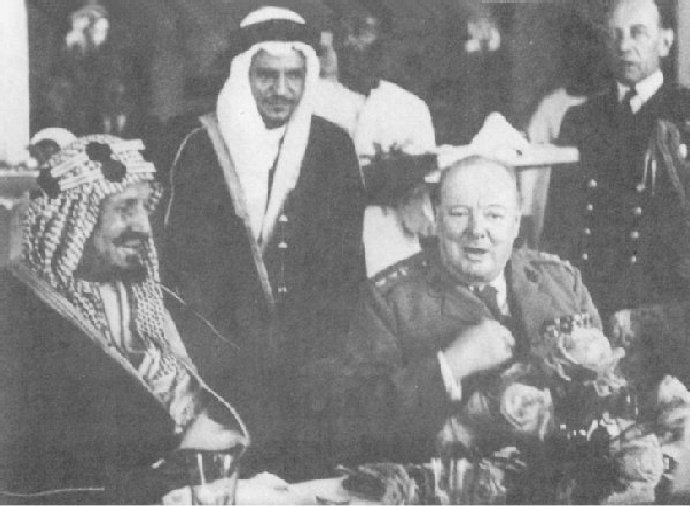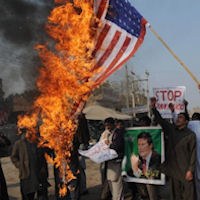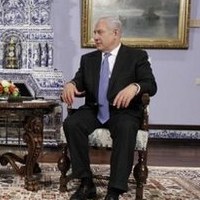![]()
Fri, Nov 26, 2010 | Edited by Crethi Plethi

King Abdul Aziz (Ibn Saud) met with the President of the United States, Franklin D. Roosevelt, on a cruiser in the Suez Canal, 15 Feb 1945.
Letter From President Roosevelt to King Ibn Saud, April 5, 1945
Before and during World War II, the United States had an interest in friendship with Arab countries because of the US need for oil. During World War II, they also wanted assurance from Saudi Arabia concerning supplies of oil needed for the war in Europe and the Pacific. President Roosevelt also had to deal with the strong support for the Zionist movement in America.
In February 1945, following the Yalta Conference with Stalin and Churchill, President Roosevelt and King Ibn Saud met aboard the U.S.S. Quincy in the Great Bitter Lake of the Suez Canal. During the meeting, instigated by President Roosevelt, he tried to persuade Saud to give support for Jewish immigration to Palestine and hoped that Ibn Saud might be able to offer constructive advice on the Palestine issue. There, Roosevelt and Saud concluded a secret agreement in which the U.S. would provide Saudi Arabia military security — military assistance, training and a military base at Dhahran in Saudi Arabia — in exchange for secure access to supplies of oil.
Regarding Jews, Saud expressed sympathy for their plight, but he argued that a homeland for Jews in Palestine would be unfair to Palestinian Arabs. On the issue of Palestine, Ibn Saud was uncompromising.
President Roosevelt, constrained by the uncompromising attitude of Ibn Saud and impressed by the simple clarity with which Ibn Saud presented the Arab case, gave two undertakings to Ibn Saud; first that he would do nothing to assist the Jews against the Arabs in Palestine and, secondly, that he would never do anything to harm the Arab people. He promised that the United States Government would not make any changes to its policy on Palestine without prior consultation with both the Arabs and the Jews.
These verbal assurances were confirmed in a letter, dated April 5th, 1945, in which Roosevelt made it clear that he was committing himself, not as an individual, but as “Chief of the Executive Branch” of the United States Government. Roosevelt died on April 12, 1945 and his policy was subsequently reversed by his successor, Harry Truman who was a strong supporter of a Jewish homeland in Palestine.
With strong support from President Truman — and little from the U.S. State Department — the UN’s partition plan [1947] won a majority in the UN General Assembly. Truman had chosen the interests of Jews rather than give precedence to Saudi oil, and King Saud’s second son, Prince Faisal, in New York for the vote, felt betrayed.
The Letter from President Roosevelt to King Ibn Saud, April 5th, 1945:
GREAT AND GOODFRIEND:
I have received the communication which Your Majesty sent me under date of March 10, 1945, in which you refer to the question of Palestine and to the continuing interest of the Arabs in current developments affecting that country.
I am gratified that Your Majesty took this occasion to bring your views on this question to my attention and I have given the most careful attention to the statements which you make in your letter. I am also mindful of the memorable conversation which we had not so long ago and in the course of which I had an opportunity to obtain so vivid an impression of Your Majesty’s sentiments on this question.
Your Majesty will recall that on previous occasions I communicated to you the attitude of the American Government toward Palestine and made clear our desire that no decision be taken with respect to the basic situation in that country without full consultation with both Arabs and Jews. Your Majesty will also doubtless recall that during our recent conversation I assured you that I would take no action, in my capacity as Chief of the Executive Branch of this Government, which might prove hostile to the Arab people.
It gives me pleasure to renew to Your Majesty the assurances which you have previously received regarding the attitude of my Government and my own, as Chief Executive, with regard to the question of Palestine and to inform you that the policy of this Government in this respect is unchanged.
I desire also at this time to send you my best wishes for Your Majesty’s continued good health and for the welfare of your people.
Your Good Friend,
FRANKLIN D. ROOSEVELT
His Majesty
ABDUL AZIZ IBN ABDUR RAHMAN AL FAISAL AL SAUD
King of Saudi Arabia
Riyadh(1) Department of State Bulletin of October 21, 1945, p. 623.

King Abdul Aziz (Ibn Saud) attending official dinner with Sir Winston Churchill, Lake Qaroun, Egypt, 17 Feb 1945.
After the Roosevelt-Ibn Saud meeting on a cruiser in the Suez Canal, Ibn Saud met with the British Prime Minister Winston Churchill, February 17th, 1945, in the Grand Hotel du Lac on the shores of the Fayyoun Oasis, fifty miles south of Cairo. Winston Churchill attempted to link the assistance Britain had given to Ibn Saud over the years to the Palestine issue.
He suggested that Ibn Saud should use his authority and influence to persuade the Arab world to accommodate Zionist aspirations. Churchill made no promises that Britain would temper its support for the Zionists with sensitivity to Arab rights. Ibn Saud found Churchill’s views entirely unacceptable.
With the end of war in Europe in May 1945, Churchill’s government was replaced by a Labour government led by Clement Attlee. The new foreign minister, Ernest Bevin, maintained a strict blockade against “illegal” entry of Jewish refugees from Europe.



 RSS
RSS










Letter from President Roosevelt to King Ibn Saud, 1945 | Historical Documents #US #SaudiArabia #Palestine http://j.mp/eEGLdd
The Americans had over 100 treaties with the Red Indians ,who are
the actual owners of USA,but not a single treaty has ever been honoured
by the yellow men;how do you expect them to keep their word to king of saudia arabia,who is living under their protection.
May ALLAH forgive the Saudies and other muslim countries ,who know not what they are doing.
Roosevelt and Ibn Saud: https://www.crethiplethi.com/letter-from-president-roosevelt-to-king-ibn-saud-april-5-1945/usa/
Ibn Saud and #Roosevelt:
https://www.crethiplethi.com/letter-from-president-roosevelt-to-king-ibn-saud-april-5-1945/usa/